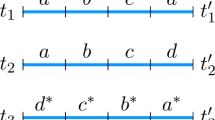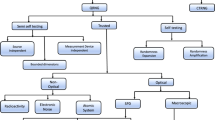Abstract
Although algorithmic randomness with respect to various non-uniform computable measures is well-studied, little attention has been paid to algorithmic randomness with respect to computable trivial measures, where a measure μ on 2ω is trivial if the support of μ consists of a countable collection of sequences. In this article, it is shown that there is much more structure to trivial computable measures than has been previously suspected.







Similar content being viewed by others
Notes
In general, we can consider any convex sum \(\frac {\alpha \mu +(1-\alpha )\nu }{2}\) of μ and ν, as long as α∈[0,1] is computable.
References
Bienvenu, L., Porter, C.: Strong reductions in effective randomness. Theoret. Comput. Sci. 459, 55–68 (2012)
Downey, R., Nies, A., Weber, R., Yu, L.: Lowness and \({\varPi _{2}^{0}}\) nullsets. J. Symbolic Logic 7(3), 1044–1052 (2006)
Downey, R.G., Hirschfeldt, D.R.: Algorithmic Randomness and Complexity. Theory and Applications of Computability. Springer, New York (2010)
Kautz, S.: Degrees of Random Sets. PhD thesis. Cornell University, Ithaca (1991)
Kurtz, S.: Randomness, genericity in the degrees of unsolvability. Ph.D Thesis. University of Illinois, Urbana-Champaign (1981)
Martin-Löf, P.: The definition of random sequences. Inf. Control. 9, 602–619 (1966)
Nies, A.: Lowness properties and randomness. Adv. Math. 197(1), 274–305 (2005)
Nies, A.: Computability and randomness. Oxford Logic Guides. Oxford University Press, London (2009)
Nies, A., Stephan, F., Terwijn, S.A.: Randomness, relativization and Turing degrees. J. Symbolic Logic 70(2), 515–535 (2005)
Schnorr, C.-P.: Zufälligkeit und Wahrscheinlichkeit. Eine algorithmische Begründung der Wahrscheinlichkeitstheorie. Lecture Notes in Mathematics, vol. 218. Springer-Verlag, Berlin (1971)
Schnorr, C.-P.: A survey of the theory of random sequences. In: Basic problems in methodology and linguistics (Proceedings Fifth Internat. Congr. Logic, Methodology and Philos. of Sci., Part III, Univ. Western Ontario, London, Ont., 1975), University Western Ontario Ser. Philos. Sci., vol. 11, pp 193–211. Reidel, Dordrecht (1977)
Soare, R.I.: Recursively enumerable sets and degrees. Perspectives in Mathematical Logic. Springer-Verlag, Berlin (1987). A study of computable functions and computably generated sets
Stanley, R.P.: Enumerative combinatorics. Volume 1, volume 49 of Cambridge Studies in Advanced Mathematics, second edition. Cambridge University Press, Cambridge (2012)
van Lambalgen, M. : The axiomatization of randomness. J. Symbolic Logic 55(3), 1143–1167 (1990)
Zvonkin, A.K., Levin, L.A.: The complexity of finite objects and the basing of the concepts of information and randomness on the theory of algorithms. Uspehi Mat. Nauk 25(6(156)), 85–127 (1970)
Acknowledgments
The author would like to thank Laurent Bienvenu, Peter Cholak, and Damir Dzhafarov for helpful conversations on the material in this article (which appeared in the author’s dissertation). The author would also like to thank Paul Shafer for useful feedback on a preliminary draft of this article.
Author information
Authors and Affiliations
Corresponding author
Additional information
The author was supported by the National Science Foundation under grant OISE-1159158.
Rights and permissions
About this article
Cite this article
Porter, C.P. Trivial Measures are not so Trivial. Theory Comput Syst 56, 487–512 (2015). https://doi.org/10.1007/s00224-015-9614-8
Published:
Issue Date:
DOI: https://doi.org/10.1007/s00224-015-9614-8




